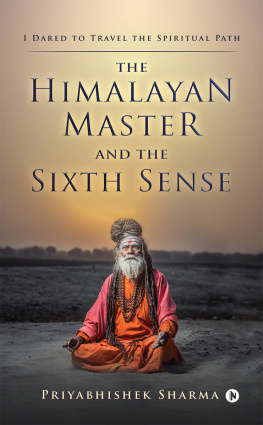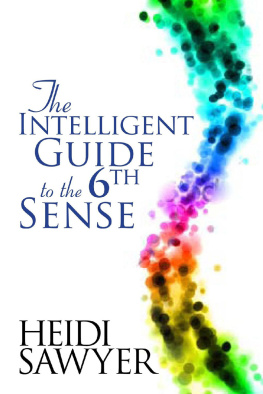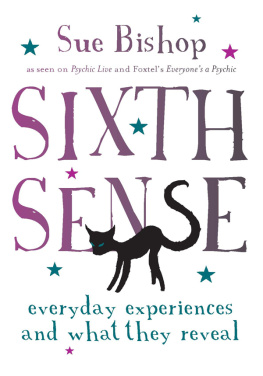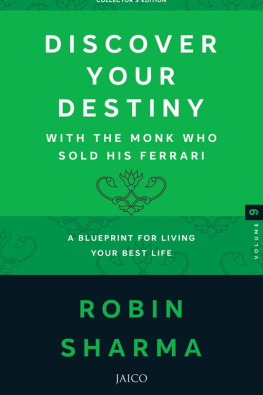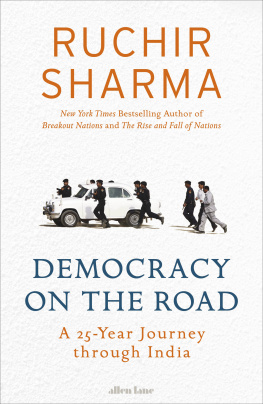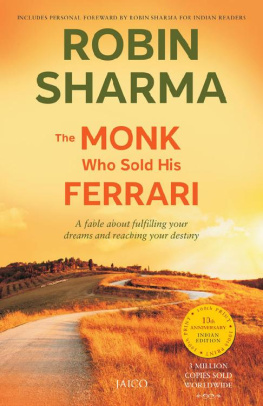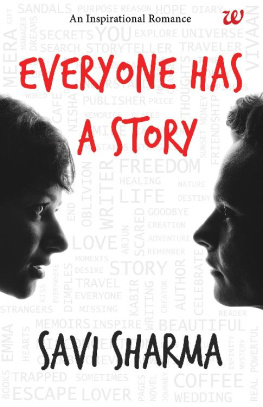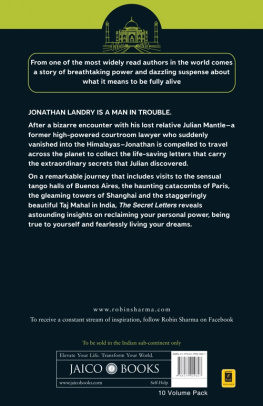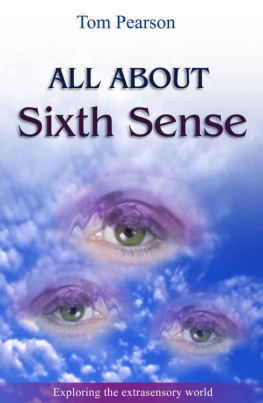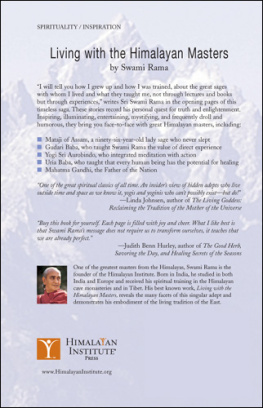Priyabhishek Sharma - The Himalayan Master And The Sixth Sense
Here you can read online Priyabhishek Sharma - The Himalayan Master And The Sixth Sense full text of the book (entire story) in english for free. Download pdf and epub, get meaning, cover and reviews about this ebook. publisher: Notion Press, genre: Religion. Description of the work, (preface) as well as reviews are available. Best literature library LitArk.com created for fans of good reading and offers a wide selection of genres:
Romance novel
Science fiction
Adventure
Detective
Science
History
Home and family
Prose
Art
Politics
Computer
Non-fiction
Religion
Business
Children
Humor
Choose a favorite category and find really read worthwhile books. Enjoy immersion in the world of imagination, feel the emotions of the characters or learn something new for yourself, make an fascinating discovery.
- Book:The Himalayan Master And The Sixth Sense
- Author:
- Publisher:Notion Press
- Genre:
- Rating:5 / 5
- Favourites:Add to favourites
- Your mark:
- 100
- 1
- 2
- 3
- 4
- 5
The Himalayan Master And The Sixth Sense: summary, description and annotation
We offer to read an annotation, description, summary or preface (depends on what the author of the book "The Himalayan Master And The Sixth Sense" wrote himself). If you haven't found the necessary information about the book — write in the comments, we will try to find it.
The Himalayan Master And The Sixth Sense — read online for free the complete book (whole text) full work
Below is the text of the book, divided by pages. System saving the place of the last page read, allows you to conveniently read the book "The Himalayan Master And The Sixth Sense" online for free, without having to search again every time where you left off. Put a bookmark, and you can go to the page where you finished reading at any time.
Font size:
Interval:
Bookmark:


Notion Press
No.8, 3 rd Cross Street
CIT Colony, Mylapore
Chennai, Tamil Nadu 600004
First Published by Notion Press 2020
Copyright Priyabhishek Sharma 2020
All Rights Reserved.
ISBN 978-1-64951-844-6
This book has been published with all efforts taken to make the material error-free after the consent of the author. However, the author and the publisher do not assume and hereby disclaim any liability to any party for any loss, damage, or disruption caused by errors or omissions, whether such errors or omissions result from negligence, accident, or any other cause.
While every effort has been made to avoid any mistake or omission, this publication is being sold on the condition and understanding that neither the author nor the publishers or printers would be liable in any manner to any person by reason of any mistake or omission in this publication or for any action taken or omitted to be taken or advice rendered or accepted on the basis of this work. For any defect in printing or binding the publishers will be liable only to replace the defective copy by another copy of this work then available.

Indic Pledge

I celebrate our civilisational identity, continuity & legacy in thought, word and deed.
I believe our indigenous thought has solutions for the global challenges of health, happiness, peace and sustainability.
I shall seek to preserve, protect and promote this heritage and in doing so,
discover, nurture and harness my potential,
connect, cooperate and collaborate with fellow seekers,
advance diversity and inclusivity in the society.
About Indic Academy

Indic Academy is a non-traditional university for traditional knowledge. We seek to bring about a global renaissance based on Indic civilizational and indigenous thought. We are pursuing a multidimensional strategy across time, space and cause by establishing centers of excellence, transforming intellectuals and building an ecosystem.
Indic Academy is pleased to support this book.
To
The Divine Mother
I write not to achieve but to awaken .

Prologue
What is that, declares Mundako Upanishads, by knowing which everything else is known. The quest to know is human but the mode of knowing is individual. When this quest takes a turn to the inner self - naturally or triggered by an event - it becomes spirituality. This spiritual urge to know our true self is natural but to begin walking on the path of spirituality is incidental, which is to say that there has to be a reason to begin that walk. Eye contact with someone whom we meet may change the direction of our lives or an event in our life may lead us in the direction to seek wisdom and deeper meaning of life. And, we set on a voyage of seeking not fully understanding what is being sought. We just start walking towards a misty destination. Thats how it happened to me. I had set out to seek something not quite clear but the journey had begun.
Why would my story matter to you or your story matter to me unless it has something meaningful to contribute to our own curiosities towards the Unknown? I am not a monk; I am at best an enigmatic married family man, father to a son, a reluctant hedonist, and had many crushes in life - the greatest being for the civil services exam that lasted for a decade. I was also not born as a great soul with an innate longing for God to be embraced by an enlightened Master to be guided into realization. I was, and am, a person of contradictions who accidentally came to the world of seeking. This elusive search, which later on became a spiritual quest, began out of the logic of circumstances let me avoid the word fate rather than out of any natural craving. Thus beginning as an accidental seeker, my footsteps gradually got firmly ensconced as a traveler of the spiritual path as I kept walking. The blurred road, however, kept opening with every stride through an exciting excursion of interesting landmarks making my journey not less worthy a pursuit to have been trudged in life than having been met with some other priority.
An accidental meeting with a Himalayan Master and my pure ad hoc drills into meditation with the beej ( Vedic seed) mantra (chant) enunciated by him changed the direction of my life when a couple of years later, one day, I awoke to a weird dream finding my mind connecting with far off places and people. This experience bewildered me but also permanently changed me now I had become a student of my own mind having turned my elusive outside search to the inside. The real journey into the world of meditation began. Going thus on, sooner, I realized that I was a victim of as well as a captive to my own mind. For at every attempt to rise, my footsteps would be clasped down to fall. However, as I kept seeking my own mind through a newly learned scientific technique of mind management called Kriya Yoga Meditation, after initial turmoil and discomfort, it started falling into place with some degree of fine-tuning with me. As this friendship between me and my mind grew, I became acquainted with the enormous powers that a focused mind was able to bestow. It opened to me a massive inner world full of spiritual possibilities that I was not aware of. As my association with the mind and meditation grew there came on this journey the third M Masters. Many Masters appeared on the path guiding me on the crossroads, some staying for a longer duration, others just disappearing after giving the important guidance. Now a fourth M had entered into my life called Miracles. The journey had become replete with so many coincidences for which a better word miracle had to be used as you would understand walking along in the succeeding pages. Now I was not walking but just skidding through towards the destination.
How many times does it happen to every one of us that our instincts turn true, our premonitions caution us of impending danger that lies ahead in our path of life or incidents cast their shadows before an event? This is called intuition or sixth sense. Intuition just simply occurs as a flash of insight. It appears not from the thought of rationality or utility but from the gap that lies between two thoughts. It is a universal faculty of every creature. Animals are known to have this gift for centuries. Human beings also experience this faculty on many occasions. A mother, for instance, develops uncanny uneasiness for no known reason when at the same time her child at a faraway place is not feeling well. How many times it turns out that the friend we are thinking about instantly gives us a phone call. These might be those instances of coincidences in life, which happen on various occasions. But these might also be a reception of the vibration emitted by the close bond between two people. In the world of mobile phones, it is not unreasonable to believe that an intense thought can also travel through some kind of energy field from one person or place to another. In the current psychological lexicon, this faculty has been investigated as the extrasensory perception (ESP).
No other term has been more assiduously dabbled by the curious human quest since the earliest times than the mind has, yet it is an elusive term. More often in common parlance, it is commonly confused with the brain. Leaving aside the fierce debate, lets say the mind is what each individual thinks, feels, wills, desires, and perceives. In other words, while the brain is an organ the mind is a process. Who gets what has been a domain of long debate between philosophers and scientists but for the well being of human life both are indispensable. Patanjali Yoga Sutra , on the other hand, defines yoga as the cessation of the modifications of the mind; the mind and its various modifications thus become extremely important to systematically proceed ahead on the eight-fold path eventually culminating into the Samadhi .
Next pageFont size:
Interval:
Bookmark:
Similar books «The Himalayan Master And The Sixth Sense»
Look at similar books to The Himalayan Master And The Sixth Sense. We have selected literature similar in name and meaning in the hope of providing readers with more options to find new, interesting, not yet read works.
Discussion, reviews of the book The Himalayan Master And The Sixth Sense and just readers' own opinions. Leave your comments, write what you think about the work, its meaning or the main characters. Specify what exactly you liked and what you didn't like, and why you think so.

